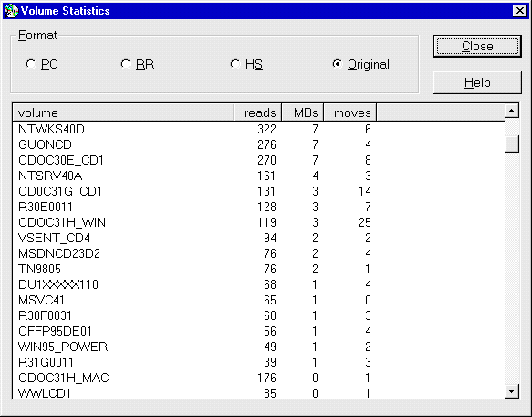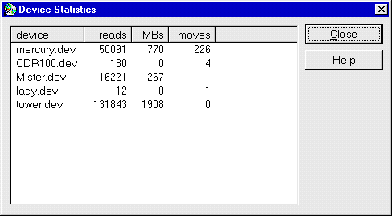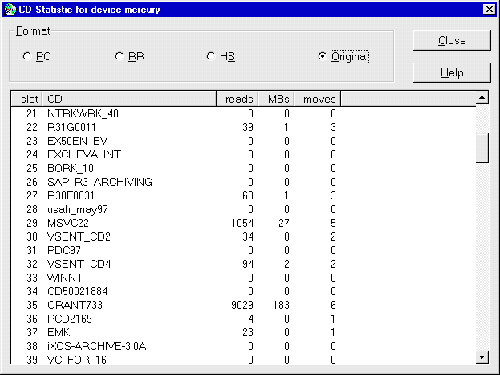
iXOS-JUKEMAN enables you to print statistics about device and disk accesses. There are three types of statistics:
* the amount of data transferred and the number of disk moves in all
controlled devices
* the amount of data transferred and the number of disk moves in a specific
device
* The amount of data transferred and the number of disk moves in one device
(summed up)
The values are with regard to the running server process. To view the
statistics for a specific disk, sort the list by disk names. One of the
following name formats may be selected: PC format, Rock Ridge format, High
Sierra format, and original disk name.
To find out which disks are accessed most frequently, the list can be sorted
appropriately. `Reads' is the number of read accesses to data blocks of 64kB
maximum.
The value `moves' is the number of times a disk is moved into a drive of a
jukebox. If this number is very large the overall performance may be improved
by inserting the disk into a separate CD-ROM drive or tower.
[STATISTICS]-VOLUME STATISTICS:
The following dialog will pop up:

The dialog displays a list of all disks controlled by iXOS-JUKEMAN and includes for each entry:
* disk name (volume)
* number of read accesses (reads)
* MBs read (MBs)
* number of moves of a disk into a drive (moves)
You can sort the list by any of the four columns by clicking that column
heading.
The disk names can be displayed in original format, PC format, Rock Ridge
format, or High Sierra format, depending on the radio button Format.
[STATISTICS]-DEVICE STATISTICS:
The following dialog will pop up:

The dialog displays a list of all devices controlled by iXOS-JUKEMAN which includes for each entry:
* device name (device)
* number of read accesses (reads)
* MBs read (MBs)
* number of moves of a disk into a drive of the device (moves)
You can sort the list by any of the four columns by clicking the column
heading.
[STATISTICS]-CD STATISTICS PER DEVICE:
The following dialog will pop up:

The dialog displays a list of all disks in the currently selected device which includes for each entry:
* disk slot (slot) and disk name (CD)
* number of read accesses (reads)
* MBs read (MBs)
* number of moves of a disk into a drive (moves)
You can sort the list by any of the five columns by clicking the column
heading.
The disk names can be displayed in original format, PC format, Rock Ridge
format, or High Sierra format, depending on the radio button Format.
Statistics can be printed from the command line with the command cdadm
survey (see also page 238).
The order of the parameters is:
1. What should be reported?
2. What should be displayed in the report?
3. Shall the report be contrained (e. g., just one device)?
4. Shall the output be sorted and by what criteria?
The first two parameters are mandatory, the others are optional.
Five list type parameters preceeded with `-' are available, one for
devices, three for disks and one for drives:
-d |
print a list of devices (jukeboxes or drives) |
-v |
print a list of disks |
-n |
print the contents of the volumes database. |
-s |
like -v, but for all slots of a device, even if only a subset of slots is configured to be used (see description of disks= in "Slot set-up" on page 59). |
-r |
print a list of drives. |
The second parameter, preceeded with `+', determines the source of
information. Depending on the list type, only several parameters can be
used.
General:
+d |
device names of attached devices (to be more specific: the names of the device description files) |
+n |
Total number of slots of a device |
+s |
Slot number |
+i |
inode number in volumes database |
Disks:
+m |
type of disk (CD-ROM, rewritable...) |
+R |
`r', if a recorder is necessary to read, `a' otherwise |
+a |
`@', if the disk is in a drive, `-` otherwise |
+u |
`+', if the disk can be accessed by the file system, `-` otherwise |
+U |
time of last access to disk in seconds since 1970 |
+S |
size of the disk, including free space (in kBytes) |
+I |
file system implementation (e. g., iso, hfs, ifs, ixw, raw) |
+v |
file system-specific information |
+Y |
`rw', if the disk is writable, `r' otherwise |
Names:
+o |
original disk name |
+r |
disk name in Rock Ridge format (rr) |
+p |
disk name in PC format (pc) |
+h |
disk name in High Sierra format (hs) |
For standard disks the name is printed in the chosen name format. Disks
exceeding the limit of licensed disks appear as "-limit-". An empty
CD-R appears as "-blank-" or "-badCD-", depending if the
recorder can tell the difference. Disks in a format foreign to iXOS-JUKEMAN
appear as "-nostd-". If it is neither possible to read the disk nor to
explicitly judge the disk as being an empty writable disk, it appears as
"-badCD-". Non-existing slots appear as "-------". This can
be the case if not all packs are fitted in a jukebox. Finally, empty slots
appear as "-empty-".
Incremental file system:
+B |
amount of data buffered for a volume |
+W |
amount of data written (physically) to the disk |
+w |
W+B (total amount of data for a disk) |
+F |
S-W (free space on physical disk) |
+f |
S-w (free space for further data) |
+T |
number of tracks written to a disk |
Statistics:
+D |
amount of data (MBytes) read from a disk |
+-D |
like +D, but set all values to zero afterwards |
+P |
number of operations on a disk, i. e. read accesses with max. block size of 64kB |
+-P |
like +P, but set all values to zero afterwards |
+M |
number of movements of a disk into a drive |
+-M |
like +M, but set all values to zero afterwards |
Examples:
The command "cdadm survey -d +d" lists the device description file
names of all attached devices.
"cdadm survey -v +dsipr" prints a list of devices names, slot numbers,
inodes and disk names in the pc and rr format for all disks
in all attached devices.
"cdadm survey -v +oIv" prints a list of original disk names, file
system implementation and file system-specific information, e. g.:
Online Docu V6tation hfs BlockSize=512 BlockCount=398748
CSMDN610C iso BlockSize=2048 BlockCount=320189
asterix ifs Blocksize=2048 Total=333000 Written=3584
Buffered=1 Used=3585 Blank=329416 Free=329415 Tracks=3
wormimage ixw Backup=0 BlockSize=1024 FCB=64-65 Data=2048-2048
CTime=878292409 Hid=1053741549 OCTime=878292409 OHid=1053741549
Restricting the output:
<column>=<value> or
<column>!<value>
You can restrict the output using parameters such as
d=<device> or d!<device>. The
former prints information for the specified device only. The latter prints
information for all other devices (negative comparison). For a disk list, you
can apply restrictions for all columns, even if a column is not selected.
Examples: "cdadm survey -v +sip d=juke.dev" will print all disks of
juke.dev. "cdadm survey -v +dsipr p=ixos96" will print the
disk with the PC format name ixos96.
Note: (t)csh and bash users must preceed ! with a backslash to escape its usual function as History operator.
Sorting the output:
Finally, you can specify how the output should be sorted:
s:<criteria> sorts the output list according to the
specified options.
<criteria> is a list of column names (may be preceeded with
`-` to reverse sort order). The output is sorted by these columns.
Examples:
"cdadm survey -v +dsipr s:d-S" lists the disks, sorted by device name
and within a device by slot number. Like restrictions, you can use sort
options, even if the specified column is not printed:
Thus "cdadm survey -v +dspr s:i" prints all disks sorted by inodes,
but does not print any inode numbers. This may be useful if you want to see
disks in the order in which they were made known to the server, because the
server associates inode numbers with disks sequentially.
The results of commands to show amounts of buffered or written data, free
space, and so on, are expressed in kBbytes (1024 Bytes).